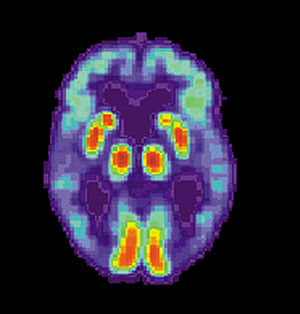 Image via Wikipedia
Image via WikipediaProtecting and preserving the brain has to out-rank any other health related strategy. It doesn't much matter how healthy the rest of the body is if the mind is gone. The brain is only 2-3% of body weight but it consumes 25% of oxygen and glucose and other vital nutrients. If there is a deficiency in the diet the brain will manifest that deficiency first through an alteration in brain controlled behaviors such as alertness, memory, or the ability to learn and perform complex tasks. Life long habits of good nutrition sustain and maintain good brain function, poor eating habits have the opposite effect.
Dementia study finds almost 40% of cases could be avoided
Doctors say eradicating diabetes and depression, prolonging education and eating more fruit and vegetables would greatly reduce the amount of people affected by the condition.

Public health initiatives aimed at achieving those results could mean that almost 40% of those who are expected to be affected by the condition in the future avoid it, they say.
A team of British and French researchers has calculated that increasing the involvement of people of all ages in education, especially literacy, would on its own bring about an 18% drop in the number of expected new cases of the disease over the next seven years.
In addition, eliminating depression and diabetes, and improving the general intake of fruit and vegetables, would lead to a further 21% fewer people succumbing to the condition, according to the co-authors, who include Craig Ritchie, a consultant psychiatrist at St Mary's hospital in London.
Some 825,000 people already have dementia in Britain and numbers are expected to exceed 1 million by 2015, given the ageing population and other factors such as rising obesity.
"Reduction in the incidence of dementia over the next seven years would be maximised by the elimination of diabetes and possibly depression. Increasing crystallised intelligence and consumption of fruit and vegetables also seem to have a potentially high impact," the researchers write in the British Medical Journal today.
They studied 1,433 healthy people aged over 65 living in the south of France, who underwent cognitive tests at the start of the study in 1999-2001 and again two, four and seven years later.
Among the factors examined, earlier detection and better treatment of diabetes was deemed the most pressing priority for anti-dementia efforts because its links with the gradual loss of mental function were well-established, they said. They recommend prompt screening for evidence of glucose intolerance and insulin resistance, which occur early in the onset of diabetes, rapid treatment of signs of depression, and that people should be encouraged to read and write more, regardless of their ability.
"We know there are links between depression, diabetes and dementia, so any policy that urges clear diagnosis and monitoring of these conditions could help make an impact on dementia," said Rebecca Wood, chief executive of the Alzheimer's Research Trust. However, a "gaping hole" in the understanding of and ability to both diagnose and treat dementia means more research is needed, she added.
Family doctors have been accused of failing to diagnose dementia early enough causing sufferers to miss out on help and support.
A Medical Research Council (MRC) study found that patients in their sixties whose condition is diagnosed by a GP typically live for an extra 6.7 years, while those whose dementia is detected as part of screening during a research study tended to have a life expectancy of 10.7 more years.
"It's clear that too little too late is being done to diagnose dementia", said Chris Kennard, chair of the MRC neuroscience and mental health board. "Without earlier diagnosis people may miss out on the opportunity to have early intervention as new treatments come along."
Alzheimer's Society acting chief executive Ruth Sunderland said the study "throws further light on the abysmal standard of dementia diagnosis in this country.
"Up to two-thirds of people with dementia never receive a diagnosis and, as this research implies, many of those who do only do so in the later stages." Action was needed to make the UK's "appalling diagnosis" rates as good as those elsewhere, she added.
Professor Steve Field, chairman of the Royal College of GPs, said that while GPs learned about dementia as part of their training, they needed to keep up to date with their knowledge of it. If so, they would be able to better identify patients with the condition as at early opportunity and then offer them early intervention to help them live high-quality, fulfilling lives for as long as possible.




1 comment:
This article is really what I'm looking for it,It has full of information about having a healthy brain to prevent Dementia and Alzheimer disease. Thanks for sharing this.
Dementia Clinic
Post a Comment